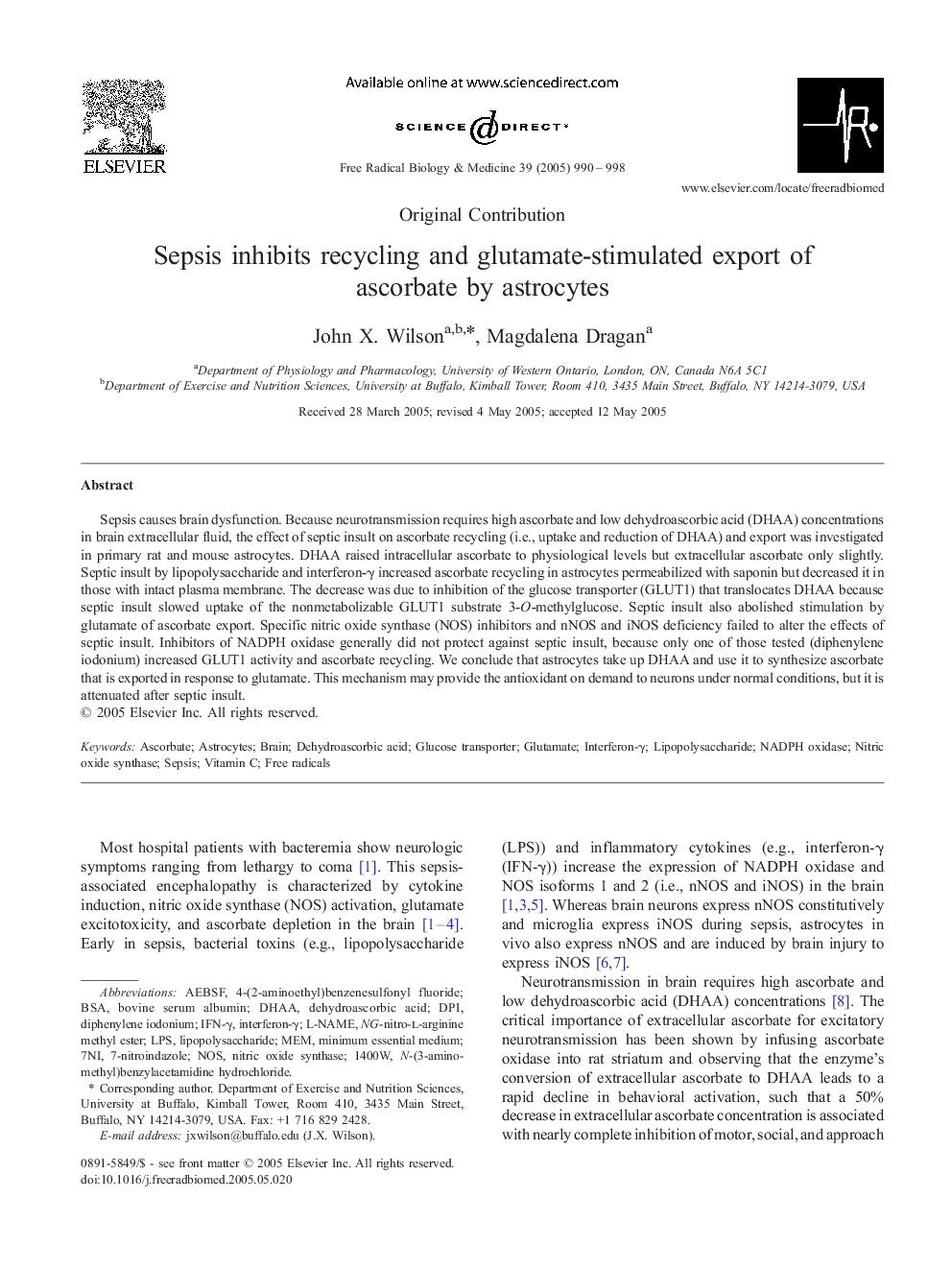| کد مقاله | کد نشریه | سال انتشار | مقاله انگلیسی | نسخه تمام متن |
|---|---|---|---|---|
| 10738954 | 1046849 | 2005 | 9 صفحه PDF | دانلود رایگان |
عنوان انگلیسی مقاله ISI
Sepsis inhibits recycling and glutamate-stimulated export of ascorbate by astrocytes
دانلود مقاله + سفارش ترجمه
دانلود مقاله ISI انگلیسی
رایگان برای ایرانیان
کلمات کلیدی
DHAA4-(2-aminoethyl)benzenesulfonyl fluorideNG-nitro-l-arginine methyl esterAEBSFIFN-γDPINOSLPS1400W - 1400 وات7-nitroindazole - 7-نیتریدازولBSA - BSAl-NAME - L-NAMEAstrocytes - آستروسیتAscorbate - آسکوربات یا ویتامین ثbovine serum albumin - آلبومین سرم گاوDehydroascorbic acid - اسید DehydroascorbicNADPH oxidase - اکسیداز NADPH interferon-γ - اینترفرون-γminimum essential medium - حداقل حداقل مورد نیازGlucose transporter - حمل و نقل گلوکزdiphenylene iodonium - دیوفنیلن یدونیومFree radicals - رادیکال آزادSepsis - سپتیسمی یا مسمومیت خونlipopolysaccharide - لیپوپلی ساکاریدMEM - مامانBrain - مغزnitric oxide synthase - نیتریک اکسید سنتازvitamin C - ویتامین سیglutamate - گلوتامات
موضوعات مرتبط
علوم زیستی و بیوفناوری
بیوشیمی، ژنتیک و زیست شناسی مولکولی
سالمندی
پیش نمایش صفحه اول مقاله

چکیده انگلیسی
Sepsis causes brain dysfunction. Because neurotransmission requires high ascorbate and low dehydroascorbic acid (DHAA) concentrations in brain extracellular fluid, the effect of septic insult on ascorbate recycling (i.e., uptake and reduction of DHAA) and export was investigated in primary rat and mouse astrocytes. DHAA raised intracellular ascorbate to physiological levels but extracellular ascorbate only slightly. Septic insult by lipopolysaccharide and interferon-γ increased ascorbate recycling in astrocytes permeabilized with saponin but decreased it in those with intact plasma membrane. The decrease was due to inhibition of the glucose transporter (GLUT1) that translocates DHAA because septic insult slowed uptake of the nonmetabolizable GLUT1 substrate 3-O-methylglucose. Septic insult also abolished stimulation by glutamate of ascorbate export. Specific nitric oxide synthase (NOS) inhibitors and nNOS and iNOS deficiency failed to alter the effects of septic insult. Inhibitors of NADPH oxidase generally did not protect against septic insult, because only one of those tested (diphenylene iodonium) increased GLUT1 activity and ascorbate recycling. We conclude that astrocytes take up DHAA and use it to synthesize ascorbate that is exported in response to glutamate. This mechanism may provide the antioxidant on demand to neurons under normal conditions, but it is attenuated after septic insult.
ناشر
Database: Elsevier - ScienceDirect (ساینس دایرکت)
Journal: Free Radical Biology and Medicine - Volume 39, Issue 8, 15 October 2005, Pages 990-998
Journal: Free Radical Biology and Medicine - Volume 39, Issue 8, 15 October 2005, Pages 990-998
نویسندگان
John X. Wilson, Magdalena Dragan,